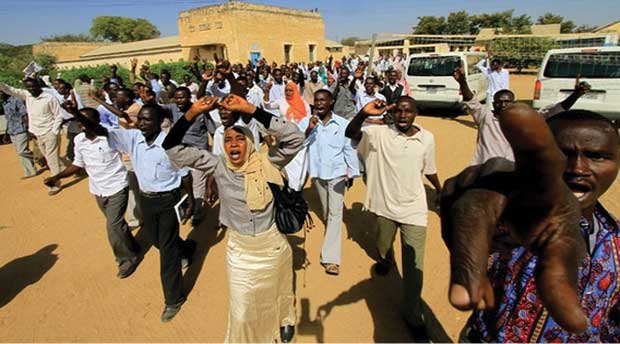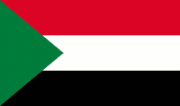
In 2016, we submitted to the UN Mechanisms 36 communications regarding 13 individuals.

SUDAN
 Our Concerns
Our Concerns
- Systematic use of torture and other cruel, inhuman or degrading treatment;
- Excessive use of force, summary executions, enforced disappearances, and arbitrary arrests of journalists, political opponents, and human rights activists, including students;
- Restrictions on and repression of the rights to freedom of expression, association and peaceful assembly;
- Non-compliance with international standards relating to fair trial guarantees;
- Impunity for perpetrators of serious human rights violations.
 Recommendations
Recommendations
- Ratify the UN Convention Against Torture and adopt domestic legislation on torture that is consistent with international norms;
- Cease the harassment of and crackdowns on journalists, human rights defenders, and other political opponents;
- Guarantee the right to freedom of expression, association and peaceful assembly;
- Abolish the jurisdiction of military courts to try civilians and respect all fair trial guarantees;
- Combat impunity by prosecuting the perpetrators of serious human rights violations and repeal the de jure immunity enjoyed by NISS and members of the armed forces.
 Upcoming
Upcoming
- 31 July 2017: Submission of Sudan’s fifth periodic report to the Human Rights Committee.
In 2016, the human rights situation in Sudan continued to deteriorate despite the efforts to resolve the ongoing conflict between the Sudanese government and oppositional factions, which took place throughout the year, sponsored primarily by the African Union. In August 2016, a coalition composed of members of the opposition and certain rebel groups met with representatives of the Sudanese government in Addis Ababa, as a result of which a “roadmap agreement” was signed to assist the parties to the conflict in reaching a comprehensive peace agreement, a cessation of hostilities, and to allow access for affected areas to receive humanitarian assistance. The agreement also proposed a comprehensive resolution to the conflict in the Darfur, South Kordofan, and Blue Nile States. This, however, collapsed within days due to a lack of agreement between the parties on their respective requests.
Furthermore, State repression of political opponents and peaceful demonstrators continued unabated. In April 2016, following the killing of a student by the National Intelligence and Security Services (NISS) during a peaceful university march, a wave of protests shook university campuses across the country, including in Khartoum, North Kordofan, and South Darfur. The same security services responded to these protests with tremendous violence, firing at protesters, conducting arbitrary arrests, as well as killing and wounding several others in April and May 2016.
Similarly, in December 2016, the Sudanese government’s choice to raise the prices of fuel and electricity resulted in a call to civil disobedience. Citizens and workers began boycotting schools and work to protest against subsidy cuts and the inflation. The government responded with the arbitrary arrests and detentions of members of syndicates and political opponents, most of whom it accused of “calling for protests and strikes”.

Arbitrary arrests, secret detention and torture of political opponents and peaceful demonstrators
All throughout 2016, members of the NISS carried out arbitrary arrests of political opponents, students, peaceful demonstrators, and journalists, all of whom were secretly detained for long periods of time. Victims of such abuses are usually arrested without any warrant, held in secret detention for extended periods, and then tortured to extract self-incriminating confessions, which will be used by the authorities to charge them and formalise their detention.
This was the case when, in April 2016, Sudanese students engaged in peaceful demonstrations on university campuses to protest the renting of university buildings for tourist purposes. NISS agents, using excessive force, met the demonstrations with swift and brutal action, arbitrarily arresting, secretly detaining, and torturing hundreds of students as a result.
Similarly, Alkarama reported the case of Mohamed Faroug Suliman Mahmoud and Murtada Ibrahim Idriss Habani, two senior members of Sudanese opposition parties, who joined the university students in peaceful demonstrations, and were consequently arrested by NISS agents without a warrant, forcibly disappeared, and secretly detained for over a month before being released.
The NISS crackdown on university campuses constitutes only one of the many human rights violations committed by the Sudanese authorities in contravention of the fundamental rights to freedoms of expression, of association and of peacefully assembly. Torture remains a widespread and systematic practice, favoured not only by Sudan’s non-ratification of the Convention against Torture, but also by the extremely vague definition of torture under Sudanese criminal law which facilitates continuous abuses.

Excessive use of force by security forces and summary executions
This year again, summary killings, often as a result of the excessive use of force by State agents, have proven to be a major cause for concern in Sudan. As such, it is common for security services, in particular the NISS forces, to abduct, arbitrarily arrest, detain, as well as torture members of the opposition, students, journalists, and human rights defenders. Moreover, security services have regularly resorted to an excessive use of force against young peaceful demonstrators; seen as a threat to the regime and the political status quo, in that they are not afraid to ask for social and political reforms and democratic changes.
This is, for instance, the case of Abubakr Hassan Taha, a young Sudanese student at the Kordofan University, who participated in a peaceful march on 19 April 2016, organised to submit to the local student’s union a list of pro-opposition candidates for the union elections, which were scheduled the same day. In the midst of the protests, members of the NISS entered the university campus and fired live bullets at the students, killing Mr Taha and wounding many others. No investigations have been initiated as a result of these acts and the perpetrators are yet to be prosecuted. Impunity of this kind is perpetuated by the 2010 National Security Act, which provides NISS agents with immunity from prosecution, unless it is explicitly revoked by a direct supervisor; an unlikely reality.

DEEP CONCERN EXPRESSED DURING SECOND UNIVERSAL PERIODIC REVIEW
On 4 May 2016, Sudan’s human rights record was reviewed during the second cycle of the Universal Periodic Review (UPR), during which UN Member States made comments and recommendations, which, in turn, the Sudanese authorities can choose to either accept or reject.
Alkarama participated in the review by providing a shadow report on the current human rights situation in the country and evaluating the implementation of recommendations made during the first cycle in 2011. The second UPR cycle not only showed that most of the previously accepted recommendations had not been implemented, but also casts serious doubt as to the Sudanese government’s genuine commitment to uphold human rights.
During the review, both civil society actors and UN Member States criticised the Sudanese authorities for having failed to amend the country’s constitutional and legislative frameworks and to cooperate with the UN human rights mechanisms, notably by dismissing requests for country visits from the Special Procedures. Member States also denounced the restriction on political pluralism and freedom of expression, as well as the practice of arbitrary detention and summary executions. Moreover, Member States condemned the widespread use of torture and the impunity of NISS agents who remain immune from prosecution. Strong concerns were also raised on the use of military tribunals to prosecute civilians for acts which fall under freedom of opinion and expression as well as freedom of peaceful assembly and association.
In the framework of the second UPR review, despite Sudan’s declared commitment to implement legal reforms in the country, the State merely agreed to “consider” the ratification of several core human rights instruments, including the Convention against Torture and the International Convention for the Protection of All Persons from Enforced Disappearance. Likewise, the authorities rejected several recommendations geared towards the revision of national laws that have an impact on human rights violations, such as the 2010 National Security Act, which grants security forces expansive powers to arrest and detain individuals without any judicial oversight. While, on the one hand, Sudan declared its “openness to collaborate with the UN human rights mechanisms”, on the other hand, it rejected multiple recommendations to respond positively to all requests for country visits by the UN Special Procedures. Sudan made other self-contradictory statements during the review, such as declaring its commitment to grant a safe environment for journalists, political opponents, and human rights defenders, after having barred local civil society from traveling to Geneva to attend the UPR session.
In light of Alkarama’s report and in addition to the outcome of the UPR review, recommendations were made to amend existing domestic laws, ratify and implement international law treaties, as well as put an end to practices that violate basic human rights. Simultaneously, Sudan was advised to cooperate constructively with the UN Special Procedures.